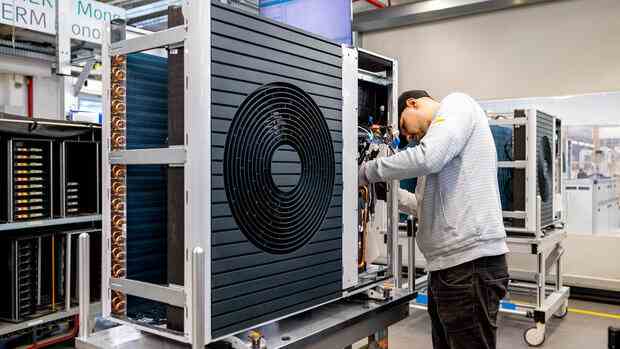Dusseldorf The heat pump market in Germany is growing rapidly. German manufacturers can hardly keep up with production: many homeowners have to wait months for the heat pump they have ordered. The German heating manufacturer Vaillant is now massively expanding its production and is putting a new mega-factory for heat pumps into operation in the Slovakian district of Senica. The company from Remscheid in North Rhine-Westphalia announced this on Friday. Production is scheduled to start in May 2023.
The new plant is designed for an annual production capacity of 300,000 heat pumps. This means that Vaillant has doubled its production capacity to more than half a million heat pumps per year. The CEO of Vaillant, Norbert Schiedeck, said: “With the start of the new mega factory, we are driving forward the transformation of the Vaillant Group into a leading manufacturer of heat pumps.”
Sales of heat pumps are currently increasing extremely quickly. In 2022, 236,000 heat pumps were sold in Germany, 53 percent more than in the previous year. On the other hand, sales of classic gas heaters fell by eight percent. This development puts German heating engineers under pressure and creates a new competition for shares in the heating market.
It is unclear how quickly Vaillant can ramp up production of heat pumps
The new Vaillant factory covers an area of 100,000 square meters. That corresponds to more than 14 soccer fields and is twice the size of the new heat pump factory in Poland that competitor Viessmann announced last summer. The production of heat pumps requires significantly more space than that of classic gas wall devices.
Vaillant has invested around one billion euros in the expansion of the heat pump business since 2016 and intends to invest another billion in the coming years. Viessmann also announced last spring that it would invest one billion in heat pumps and other green air conditioning solutions over the next three years.
The area covers 100,000 square meters.
The two companies have a strong position in the European heating market, especially in the gas heating segment, as does their competitor Bosch. In Germany, Viessmann and Vaillant are now also market leaders in the heat pump sector and are also competing here with the manufacturer Stiebel Eltron, which specializes more in air conditioning units. In order to maintain their market dominance, they want to further expand their capacities.
>> Also read: Conversion of the heat supply – This is coming to owners from 2024
According to an industry insider, the total production capacity of 500,000 heat pumps per year that Vaillant is aiming for is sufficient to maintain market shares – but is not sufficient to increase them. A company spokesman says that Vaillant wants to be just as strong with heat pumps as it is with gas heating.
However, it will take some time for Vaillant’s new factory to reach its target total production capacity of 300,000 heat pumps per year. According to a company spokesman, the plant will not be able to produce at full capacity until 2024.
France and Italy install significantly more heat pumps than Germany
Large production capacities are urgently needed. Figures from the European Heat Pump Association (EHPA) show that many more new heat pumps have recently been installed in France and Italy than in Germany. In France there were around 462,000 last year and in Italy 502,000. That is already as much as Germany intends to achieve next year.
>> Also read: The political excitement over the gas heating ban is a farce
The federal government wants to enact a law that from 2024 will stipulate that every newly installed heating system must be operated with 65 percent renewable energy. As a result, new gas or oil heating systems would have to be supported with heat pumps, which should give a strong boost to sales.
Economics Minister Robert Habeck announced on Thursday that he intends to accompany the changeover with a social support program worth billions so that the project does not fail due to the financial possibilities of many homeowners. Funding should be based on income.
In addition, there should be numerous exceptions and transitional periods. “Climate neutrality must not become a social problem,” said Habeck at a press conference. The draft bill for the 65 percent rule, drafted jointly by the Economics Ministry and the Building Ministry, was sharply criticized by the opposition and the FDP. Bavarian Prime Minister Markus Söder described the proposals as an “attack on the middle class and the socially disadvantaged”.
Habeck, however, described a rapid turnaround in heat as “mandatory” on Thursday. Germany must “catch up in a short time” when switching to renewable energies, which has not been done in recent years.
More: Is the heat pump worthwhile in the long term in comparison?
